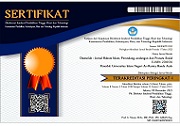PREWEDDING PHOTO PROCESSION AND THE ROLE OF THE FAMILY IN THEM
Abstract
In Islamic law, pre-wedding photos have not been regulated in detail. However, pre-wedding photo activities have become commonplace by the community. It becomes a problem when pre-wedding is currently done with an intimate scene, usually the prospective bride uses sexy clothes and is also not accompanied by her mahram when doing pre-wedding photos. Even though there have been many fatwas and studies on the limits of permissibility and prohibition in the pre-wedding procession.The results show that the pre-wedding procession that is carried out by the community in terms of poses, clothes, and also assistance in accordance with Islamic law, the law is permissible. However, it often happens in the community to take photos before the marriage contract with scenes as if they are legally husband and wife and the bride's family knows without prohibiting, directing, and guiding them according to Islamic teachings. In this case the role of the family is very important, we as parents must understand the basis of religious knowledge and how to instill religious values in our children since childhood is the key to this problem dilemma.
Keywords
Full Text:
PDFReferences
Abdullah bin Muhammad bin Abdurrahman, Tafsir Ibnu Katsir, Juz 14, (Bogor: Pustaka Imam Asy-Syafi’i).
Abdurrahman Ghazaly, Fiqih Munakahat, (Jakarta:Kencana, 2006).
Abu Malik Kamal bin Sayyid Salam, “Fiqih sunah untuk Wanita”, (Jakarta : Al – I‟tishom Cahaya Umat, 2007).
Al-Bukhari, Shahih Bukhari, Hadis No. 5233, (Beirut: Dar Ibnu al-Katsir: 2002).
Athian Ali Moh. Dan’i, Keluarga Sakinah, Cet. III, (Jakarta: PT. Raja Grafindo Persada, 2004).
Ibnu Mas’ud, Edisi Lengkap Fiqih Madzhab Syafi’i, Buku 2:Muamalat, Munakahat, Jinayat, (Bandung: Pustaka Setia, 2007).
Neng Djubaedah, Perzinaan Dalam Peraturan Perundang-undangan Di Indonesia Ditinjau Dari Hukum Islam, (Jakarta: Kencana Prenada Group, 2010).
Sayyid Sabiq, Fiqih Sunnah 3, (Matraman Dalam : PT. Tinta Abadi Gemilang, 2013).
Soejono, Soekamto, Sosiologi Suatu Pengantar, (Jakarta : CV. Rajawali Press, 1990).
Srijanti, Purwanto S.K, dan Wahyudi Pramono, “Etika Membangun Masyarakat Islam Modern”, (Yogyakarta: Graha Ilmu, 2007).
Syaikh Ahmad bin Musthafa al-Farran, Tafsir Imam Syafi’i Surat al-Hijr – Surat an-Nas, Jilid 3 (Jakarta: Almahira, 2006).
Zakiyah Drajat, Pendidikan Islam dalam Keluarga dan Sekolah, Cet.2, (Jakarta: Remaja Rosdakarya Offset, 1995).
Ahmad Musthafaal-Maraghi, Tafsir al-Maraghi, (Semarang: Toha Putra, 1992).
DOI: http://dx.doi.org/10.22373/dusturiyah.v10i2.8251
Refbacks
- There are currently no refbacks.
Copyright (c) 2020 Aulil Amri
All papers published in Dusturiyah: Jurnal Hukum Islam, Perundang-undangan dan Pranata Sosial are licensed under a Creative Commons Attribution-ShareAlike 4.0 International License. |
Office address: Fakultas Syariah dan Hukum Universitas Islam Negeri Ar-Raniry. Jl. Ar-Raniry, Kopelma Darussalam, Syiah Kuala, Banda Aceh, Aceh, Indonesia 23111. Email: jurnal.dusturiyah@ar-raniry.ac.id
















